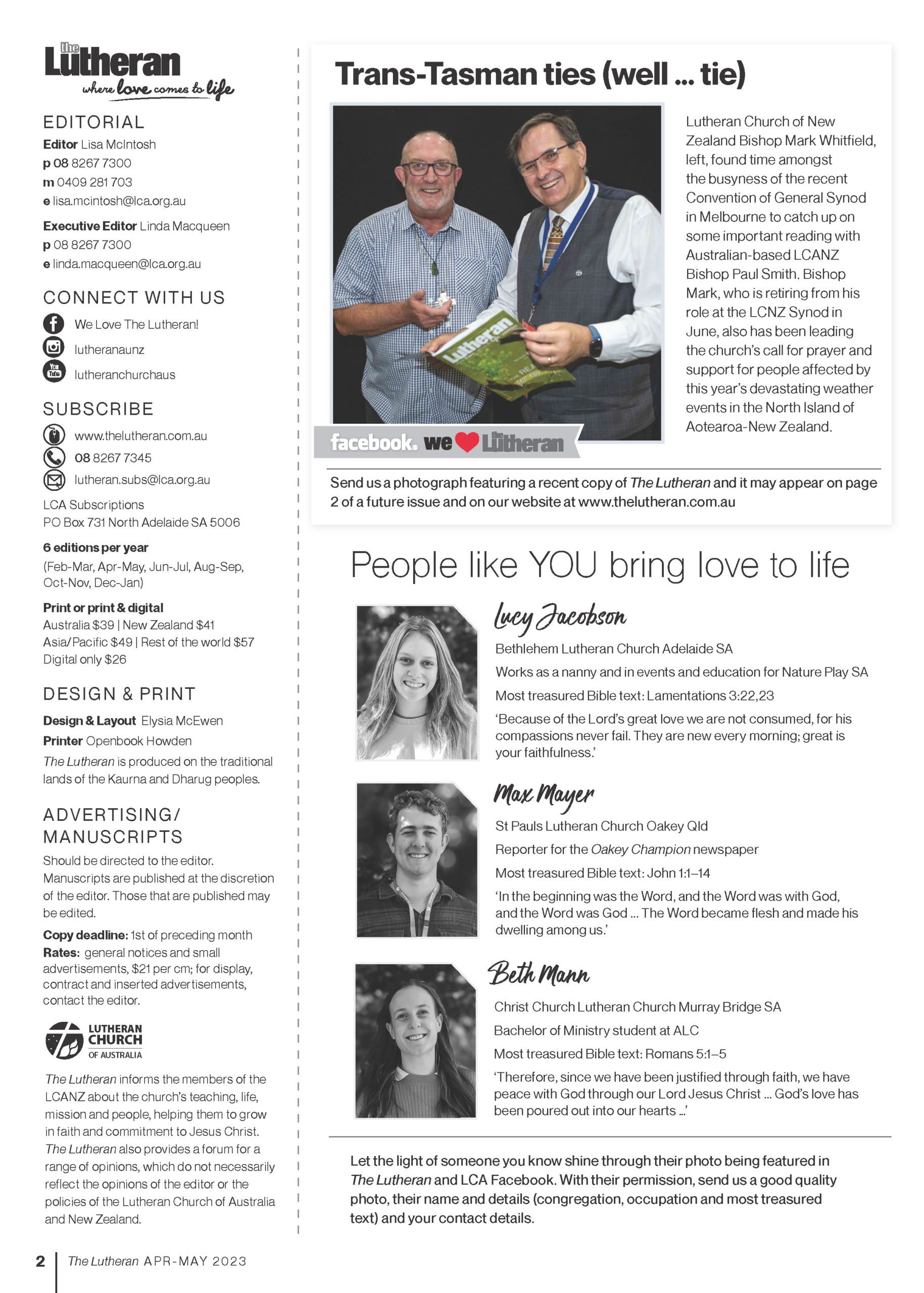Bishop Paul’s letter
Rev Paul Smith
Bishop, Lutheran Church of
Australia and New Zealand
God the builder: ‘Jesus said, “I will build my church and the gates of Hades will not prevail”’ (Matthew 16:18b).
We continually ask the Lord to ‘raise workers’ for the harvest. We see more pastors retiring. We see an increasingly short supply of Lutheran people trained to serve as school ministry workers and principals. We see aging congregational communities and the closure of buildings.
God sees people of the church, in work that he has commissioned. It was our Lord Jesus who declared ‘you will be my witnesses in Jerusalem, in all Judea and Samaria, and to the ends of the earth’ (Acts 1:8).
This does not mean that the church ignores matters of concern about church life. We need to be properly preparing women and men for the various ministries of the church. We need to continually work on evangelism as a primary task. We need to encourage one another, including young adults, to offer our gifts in service for the mission that God has given us.
In the ages of the church since the time of the resurrection of our Lord, there have been church bodies that have grown, diminished and concluded. Ephesus is a good example of this. Ephesus received a letter in the New Testament and an historic early church council was held there. You can visit Ephesus today, but it is an archaeological site. We can imagine the grief as the Ephesian Christians faced closure.
The mission of God is much more than the demography of any one church organisation. In New Zealand and Australia, we are seeing church organisations declining in numbers, but this is not the same in other parts of the world. The Ethiopian Evangelical Church Mekane Yesus has more than 10 million members and is increasing in numbers. The Evangelical Lutheran Church in our neighbouring Papua New Guinea also continues to grow and now includes more than 1.8 million members.
What is certain is that our Lord has declared that he will be actively building his church and that the gates of Hades will not prevail against it (Matthew 16). This is a sure promise for our witness and service as people of the worldwide mission of God that is at work in the Lutheran Church in New Zealand and Australia.
This does not mean we should refrain from grieving at the closure of a church building or of a ministry in which we have been involved. We human beings know the pain of loss. If you know of a congregation that is closing or has closed in recent times, please pray for those folk and consider how you might reach out to them in their struggle.
Please also regularly pray for the ever-growing mission of God and for our place as Lutherans in the Lord’s promised building of his church.
Our Lutheran church has established a ministry called New and Renewing Churches which is tasked with asking the important questions about evangelism in the church, and then helping communities actively co-operate and practically plan together, in the mission that our God has given to us.
In Australia in particular, we know that people continue to cherish the witness and service of our Lutheran schools and Lutheran care facilities like our aged-care communities. We must ask what this means for us and for our participation in the mission of God.
The College of Bishops has established the Ministry Future project to help us to be better able to identify issues about ministry and to discover good solutions to those issues.
In the song, ‘Reaching out with open arms’, Australian songwriter Robin Mann has taught us to hopefully sing:
‘Take up Jesus’ cup, drink it to the end;
love, give, start to live; we are Jesus’ friends.
May we care with our actions and our prayers.
We’ve been given so much, people, let’s all share!
Reaching out, reaching out, reaching out with open arms.’
In Christ,
Paul
Lord Jesus, we belong to you,
you live in us, we live in you;
we live and work for you –
because we bear your name.




